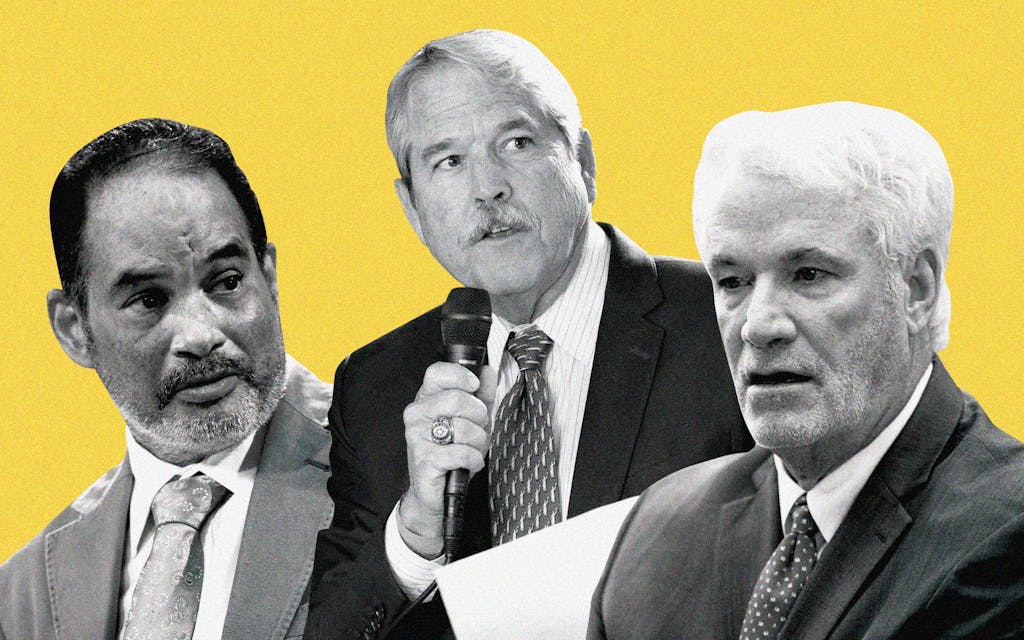Since 1973, our biennial list of the best and worst legislators has tried to make the chicanery (and occasional valor) of the Texas Legislature a little more visible through brief portraits of the body’s saints and sinners. We try to capture the wackiness of the proceedings while taking seriously the impact that decisions made in the Capitol have on the lives of Texans. This year’s Best and Worst list is the product of hundreds of conversations with lawmakers, legislative staffers, lobbyists, activists, and other observers of the Lege. We’ve done our best to consider the perspectives of many warring parties and double-check their claims.
That has been difficult to do this year. The Eighty-seventh has been an unusually closed session, partly because of the pandemic and also because legislative leaders used COVID-19 as an excuse to restrict access. The House only began to let reporters back onto that chamber’s floor in early May. The Senate never let them in. A Capitol that usually throbs with activity felt abandoned, with echoing hallways and closed doors. Citizens testified over Zoom, and lawmakers debated bills beneath mostly empty galleries. Lobbyists’ expenditures this session on food and booze were the lowest since at least 2005.
The session overlapped with two of the biggest crises the state has faced in recent memory: the pandemic, which has killed at least 50,000 Texans so far, and the February blackouts, which killed an estimated 700. Both exposed decades of underinvestment and mismanagement of the state’s critical infrastructure. But lawmakers didn’t concern themselves much with the state’s health-care system, and even the blackouts quickly took a back seat. Higher-than-expected tax revenue and a flood of federal money meant lawmakers avoided the difficult budget-wrangling that normally accompanies a cash crunch. Instead, much effort was spent on expanding gun rights, strengthening prohibitions on abortion, and mitigating the purported threat posed by transgender children.
The lurch to the right marked a radical change in direction from the last session, in 2019, an extended kumbaya during which Republicans focused on smiling and investing in public education. It may be tempting to give rookie House Speaker Dade Phelan the credit (or the blame), but the difference has more to do with the underlying political realities. In 2019, after a poor showing in the 2018 midterms, Republicans worried about losing the House in the 2020 elections, so they tacked to the middle. It worked, and Democrats belly-flopped.
In 2022, after a special session on redistricting later this year, many GOP lawmakers will seek reelection in new, heavily gerrymandered districts where they will need to worry more about challengers from their own party than Democrats. To win primary voters, incumbent Republicans need conservative red meat, and they got it by the truckload. So did Governor Greg Abbott and Lieutenant Governor Dan Patrick, who both face reelection next year. Over the course of the session, Abbott, Patrick, and Phelan seemed to be trying to out-conservative one another—until they wound up embracing positions that made many Republicans privately queasy, such as allowing Texans to carry handguns without a license or any sort of training.
With their dreams dashed, Democrats in the lower chamber turned to what they do best: infighting. A late-session walkout to kill the hated voting-restriction bill brought them together, but the victory is likely to be short-lived, with a special session coming. In the Senate, Democrats continued to adopt the position of penitent irrelevance. Many years could elapse before the state’s minority party has a shot at real power again, and it’s certainly acting like it.
If much of this sounds unfortunately reminiscent of Congress to you, you’re right. As recently as 2013, we wrote that the Legislature was a place where “personality has more to do with success or failure . . . than party or ideology.” Personality still matters in the Lege, and some of our Bests this year have made it work for them and for Texas. But, as in D.C., partisanship and ideology rule the day.
If there’s one trait that binds the Bests together, it’s that they’re in touch with what remains of the positive traditions of the Lege—bipartisanship in pursuit of a common good, a willingness to stand apart from the pack, and a focus on the needs of constituents above donors and special interests. The Worsts are examples of what ails the Legislature: intransigence, small-mindedness, and mean-spiritedness.
The Best
- Representative Senfronia Thompson
- Representative Jeff Leach
- Representative Angie Chen Button
- Representative Terry Canales
- Representative Stephanie Klick
- Representative James Talarico
- Representative Dustin Burrows
- Representative Chris Paddie
- Representative Donna Howard
- Representative Trent Ashby
The Worst
- Representative Briscoe Cain
- Representative Harold Dutton
- Lieutenant Governor Dan Patrick
- The Senate Democrats
- Representative Gary Gates
- Senator Bob Hall
- Senator Charles Perry
- Representative Kyle Biedermann
- Representative Steve Toth
- Senator Bryan Hughes
Special Awards
- Bull of the Brazos: Representative Jessica González
- The Cockroach: Representative Bryan Slaton
- Furniture
- Honorable Mentions
- The Freshman Class
The Best

Representative Senfronia Thompson
D-Houston
In the House, many new members serve a few years at most before getting bored and exchanging public service for a more entertaining hobby. Not the woman known as Ms. T, who joined the lower chamber in January 1973, a tenure that predates the birth of Speaker Dade Phelan by a couple years. She has been present at about a third of the legislative sessions since Reconstruction. She’s a Texas institution.
The archetypal politician is elected as a true believer but then becomes cynical, even corrupt, over years in office. But sometimes the opposite is the case. The first time Thompson made this list, in 1979, we named her a Worst. Under investigation for misuse of her state credit card, she disappeared from the body for two weeks. In 1983 she reappeared as Furniture. But by 2001 she was a Best. In 2009, when she made the list again, we described her as “universally loved and respected.” She still is. Thompson is supremely confident on the House floor and can make the most senior men feel like little boys. She has a sometimes wicked sense of humor, capable of reducing her colleagues to laughter with a single well-timed “God bless Texas.”
And she continues to use her senior status to try to do big things. Though several important pieces of her George Floyd Act ultimately died in the Senate, she got them through the House with the support of the Speaker’s office and even some police groups. The 82-year-old helped turn one of the sourest moments of the session—the false allegations that a lobbyist had spiked the drinks of two staffers—into a moment of reckoning over sexism at the Capitol.
She passed dozens of other do-good bills out of the House, on issues ranging from human trafficking to child care, in a climate increasingly hostile to that kind of work. Near the end of the session, one weary advocate confided that he was thinking about quitting. But one thing made him consider staying at least another session: seeing what Ms. T could get away with in her fiftieth year in office.
BACK TO LIST ⤒

Representative Jeff Leach
R-Plano
On April 29 Leach walked up the steps to the House, prepared for a bitter floor fight over his bill to protect the owners of commercial trucks and delivery vehicles from lawsuits. Instead, he engaged in almost six hours of backroom negotiations with Democrat Eddie Lucio III and other critics of his legislation. Leach told his young staffers in the room that the conversations showed that compromise and good-faith negotiations are still possible. By the time the bill passed the House, the Plano representative had forged something most parties found palatable.
Leach the Compromiser is a far cry from Leach the Destroyer, the foot-stomping tea partier of previous sessions. In 2017 he led the Mother’s Day Massacre, a slaughter of more than a hundred House bills—all because the House Freedom Caucus, a far-right group that Leach belonged to, felt disrespected. We named him as a Worst in 2019 after he left the Freedom Caucus, gained a House committee chairmanship, and clumsily handled his newfound influence.
This session, his colleagues largely found Leach a seasoned negotiator with good listening skills. “He never threatened to move on without having a thorough conversation,” said one Democrat. Leach helped pass a virtual ban on abortion, but he also curbed some of the excesses of the most extreme representatives. When a bill to impose a one-dimensional history lesson on Alamo visitors came to the floor, courtesy of the secession-loving Republican Kyle Biedermann, Leach convinced a majority of the body to include a message affirming Texas’s commitment to the Union, setting off chants of “USA! USA! USA!” More important, he joined with Democrats in pushing for criminal justice reform. His signature change—eliminating the death penalty for most coconspirators who were present at a murder but didn’t pull the trigger—sailed through the House in a powerful show of bipartisanship, though it never got a hearing in the Senate.
In short, Leach—despite his still-boyish good looks—has grown up.
BACK TO LIST ⤒

Representative Angie Chen Button
R-Richardson
Drawing an assignment on the House International Relations and Economic Development Committee is a bit like getting cast as a tree in your high school play. It’s not a sexy assignment and can serve as a sort of time-out for troublemakers. But the committee has vital responsibilities, among them oversight of the Texas Workforce Commission. One of the major problems facing new committee chair Button this session was how to allocate $1 billion in federal relief for child-care programs, which advocates worried would be wasted in the state’s underdeveloped child-welfare system.
Button, a retired Taiwanese American accountant from Garland, didn’t showboat or try to upstage her noisier compatriots, just as she rarely spoke on the floor. Instead, she got busy. Explaining to her committee that she saw child care as a critical contributor to the state’s economy by enabling parents to work, Button led on an issue typically championed by Democrats.
During the session, she shepherded a trio of bills through the Legislature that should help guide that federal windfall into high-quality child-care programs while increasing compensation for providers. When one of those bills, authored by sophomore Democrat James Talarico, appeared to be dead in the Senate, Button walked with Talarico to the floor of the upper chamber. Together, the duo went desk to desk to convince senators to save it. Advocates say Button’s efforts should leave the state’s child-care system better off even after the federal money has run out. Plenty of her colleagues could learn from her no-drama style.
Back to list ⤒
Legislative Terms to Know: Chubbing
The late-session tactic of talking veeerry slooowwly in order to derail legislation. The House’s dollar-store version of a filibuster.

Representative Terry Canales
D-Edinburg
The last time Canales made the list, in 2015, he earned a dishonorable mention. He was a “rooster who loves the sound of his own crowing,” we wrote. Has that changed? Nope. Nor has his booming voice, his slicked-back hair, or his cologne. If you can’t hear him coming, and you usually can, you can smell him. He hasn’t put down his boxing gloves either—Canales was a vocal detractor of other Democrats this session, among them caucus chair Chris Turner, and a source of division in the House caucus.
Nonetheless, something changed with Canales this year. It might have been the retirement of his buddy Poncho Nevárez, with whom Canales caused a lot of mischief on the floor back in 2019. Another reason might be the changing political climate. South Texas Democrats, with their conservative bent, have emerged as more important brokers in the Lege. Or it could be the genes kicking in—Canales is the sixth member of his extended family to serve in the House.
Republicans respect him, partly because he’s ideologically closer to them than to many in the left wing of his party, and partly because he knows how to speak their language. (His collection of more than five hundred guns no doubt helps.) With his rising reputation, he carried a bill to install air-conditioning in jails and prisons, a long-overdue measure that would have saved lives had it not been spiked by the Senate. To get it passed in the House—123 to 18—he argued that conditions in Texas lockups were inhumane not only for inmates but also for corrections officers.
However, if you’re looking for signature Terry Canales legislation—blending culturally conservative signifiers and progressive policy—consider his proposal to revive and expand the rebate program for all-electric and plug-in hybrid vehicles. Cars would once again be eligible for a $2,500 rebate. And, for the first time, pickups would get a $4,000 rebate. The bill died late in the session, but if Canales is truly a changed man, he’ll likely get it done in 2023.
Back to list ⤒

Representative Stephanie Klick
R–Fort Worth
This quiet, self-effacing North Texan is arguably the most underrated member of the Legislature. She won’t wow you with oratory or light up #txlege Twitter with real-time color commentary on the machinations of the House. Instead, Klick is a problem-solver. A hustler. Watch her on the House floor, and you will see a woman in constant motion—moving from desk to desk, legislative texts in hand.
A registered nurse, Klick served on a state panel of vaccine-allocation experts that in December broke with the Centers for Disease Control and Prevention by prioritizing senior citizens and Texans with chronic health conditions over frontline essential workers, who tend to be younger and less likely to die if they contract COVID-19. As Klick told Texas Monthly at the time, she wanted to make sure the most vulnerable were vaccinated first. It was a controversial decision, but three weeks later the CDC followed Texas’s lead.
Klick has been out front on other issues too. One of the few conservatives in the Lege willing to take the lead relaxing the state’s prohibition of medical marijuana, she made the Best list in 2015 for spearheading a tiny program to allow doctors to prescribe cannabis oil to control seizures for those with severe epilepsy. This year, she won overwhelming bipartisan approval to expand the program to Texans with PTSD and all cancer patients.
Klick is true to her tea party roots, though. She proposed legislation to limit pill-induced abortion, and she stood smiling behind Greg Abbott’s right shoulder as he signed into law the “fetal heartbeat” bill, which outlaws abortions as early as six weeks into a pregnancy—before many women know they’re pregnant. The former chair of the Tarrant County Republican Party, she surprised some of her colleagues by softening proposed voting restrictions that could make it harder to cast ballots by mail.
Normally, Klick is “strong-willed and not easy to change,” said one of the Democratic negotiators. But he found her “surprisingly gracious and amenable to working things out.”
Of the 83 Republicans in the House, only 7 are women—and only Klick chairs an A-list committee. That underrepresentation is a shame because, as Klick demonstrates, a woman’s place is in the House.
Back to list ⤒

Representative James Talarico
D–Round Rock
Talarico is the youngest member of the House, and he plays the part: when the former middle school teacher steps up to the mic to begin questioning, he often seems like Encyclopedia Brown on the trail of his latest case. And he is, indeed, whip-smart.
A master’s in education policy from Harvard helped him score a coveted spot on the Public Education Committee during his freshman session, in 2019. In his sophomore session, Talarico broadened his portfolio. He leveraged personal relationships with Republicans, among them Button, to pass a bill, described by one advocate as “twenty years in the making,” to better ensure the quality of child-care providers. He also proved as adept as any lawyer in the chamber in his questioning of divisive bills. After repeatedly skewering Steve Toth’s legislation to ban the teaching of “critical race theory,” he killed it on the last Friday of the session with a well-placed point of order. (The Republican majority later bent—and may have broken—Senate rules to save it.)
Like any good millennial, Talarico is a savvy user of Twitter. In April, following a Type 1 diabetes diagnosis, he authored a thread about paying $684 for his first thirty-day supply of insulin and received more than 60,000 retweets. Over the next few weeks, he was instrumental in passing a bill limiting insulin co-pays to $25 a month. Case closed!
Back to list ⤒
Legislative Terms to Know: “With all due respect…”
What one lawmaker says to another lawmaker before treating him or her with less than full respect.

Representative Dustin Burrows
R-Lubbock
Lawmakers will forgive many of their colleagues’ transgressions: DWIs, infidelity, not picking up the tab at the Cloak Room. But betrayal is an almost unpardonable no-no at the Capitol. So how did Burrows, who came into the session best known for plotting against fellow Republican House members, leave with the moniker “Mr. Fix-It”?
To recap: after the 2019 session ended, a secret recording surfaced of Burrows, the House GOP chair, telling a conservative activist about ten Republicans he wouldn’t mind seeing defeated in the 2020 elections. Et tu, Burrows? House Speaker Dennis Bonnen, who was also caught on the tape, soon announced that he would not run for reelection, and Burrows traveled the state apologizing to some, but not all, of the ten for his behavior.
Who would want to work with the Machiavelli of the High Plains this session? For one, new Speaker Dade Phelan, Bonnen’s successor. Phelan surprised many by appointing Burrows chair of the powerful House Calendars Committee, which sets the agenda for floor debate. Burrows quickly proved you don’t necessarily need goodwill to be effective if you have power. Early this year, one of the ten he backstabbed told him, “I can work with you, but I don’t trust you.”
Burrows was essential in orchestrating closed-door meetings to reach deals on contentious legislation and stuck his neck out to block some of the ugliest proposals. This session, Texas lawmakers, like those in 36 other states, introduced a slate of bills targeting trans rights. Working with LGBTQ groups and big business, Burrows set debate on two such bills so low on the calendars that they didn’t come to a vote before the end of session—a homicide with no fingerprints. By May, the lawmaker who begrudgingly worked with Burrows said he still didn’t fully trust the Lubbock rep. But even he conceded that Mr. Fix-It had done a fair job of steering the Calendars Committee. That’s at least one thing Burrows doesn’t need to apologize for.
Back to list ⤒

Representative Chris Paddie
R-Marshall
Paddie is a survivor. Like Talleyrand, the French diplomat who outlasted two kings, an emperor, and a revolution, this East Texan with blocky glasses and dark eyes has won leadership posts under the past three Speakers. He has been so successful that he’s earned the nickname El Gato, because, as one lawmaker told us, “he always lands on his feet.”
Texas should be glad he does, for the most part. Though some lawmakers blanch at Paddie’s political gamesmanship, his colleagues give him high marks for navigating complex issues. Speaker Phelan made Paddie the chair of the House State Affairs Committee, a critical clearinghouse for major, controversial bills. Paddie followed in his predecessor’s footsteps (someone named Dade Phelan) in keeping hearings generally calm and respectful. Among his kindnesses: saving the state from the indignity of a hearing on Biedermann’s secession bill.
After the February storm exposed the fragility and inept regulation of Texas’s electricity sector, Paddie engaged in a fact-finding mission. He forged agreement on complicated electric-grid legislation that most legislators preferred not to study up on. At a time when lawmakers were eager to burn power producers at the stake, he kept members focused on substantive reforms (though some experts say they’re insufficient to prevent future blackouts). Colleagues from both parties said Paddie was an honest broker and allowed video testimony amid the pandemic, while other committee chairs pretended the technology didn’t exist. As one Democrat said, “He’s a workhorse, not a show horse.”
Back to list ⤒

Representative Donna Howard
D-Austin
When Howard speaks, members of both parties listen. In a chamber of lawyer-politicians who love to hear themselves talk, Howard, who has a background in nursing, is the rare orator who seems to speak from the heart as much as the head. Agree with her or not, she served as a voice of reason and moderation during this ugly session. During debate on legislation that would ban abortion after about six weeks, she patiently explained the science of conception and fetal development. Has anyone ever been compelled to use the word “menstruation” so much in one session?
Despite losing the fight, Howard kept her poise. The next day, she silenced the House with a personal address. It had been just a little less than two years, she said, since her husband had suffered a massive heart attack, the beginning of a long slide in his health that ended in his death. Along the way, they lost their home and watched as their insurance coverage ran out. As terrible as the experience had been, her struggles had made her more attuned to the hardships of other Texans, she explained. What buoyed her was her legislative family. “Despite any of our differences, you only gave me love,” she said, as at least one member held back tears.
It’s that kind of gravitas that helps Howard—one of the more liberal members in a conservative House—get things done. This session, she continued making progress on protecting sexual assault victims, passing legislation to provide survivors the option of having an advocate present during law-enforcement interviews. She also worked with Republicans to ban businesses from asking prospective employees about their criminal history on initial job applications. Much to the discredit of the four Speakers she’s served under, Howard has never been assigned a chairmanship. What a waste of talent.
Back to list ⤒
Legislative Terms to Know: POO
Short for “point of order,” an accusation that a bill violates House rules. Once flung by a legislator on the House floor, a POO may kill a bill—or put it in purgatory for a while. The source of a million bad jokes.

Representative Trent Ashby
R-Lufkin
Country boys will survive. Ashby, who grew up on a dairy farm and represents a rural district anchored in Lufkin, could have had a rough time in Austin this year. In October, the five-term representative declared his intention to run for Speaker. When his good friend from Beaumont, Dade Phelan, put his hat in the ring, Ashby quickly stood down . . . only to throw his support behind Geanie Morrison, whom his backers favored. Morrison fizzled, Phelan became Speaker, and Ashby ended up without a committee chairmanship, the surest indicator of who’s on Team Phelan and who’s not. Ashby expected to spend his session on the outside, looking in. Instead, he said, “it was probably the best session I’ve ever had.”
While members were fighting about wedge issues such as transgender kids and abortion, Ashby was working on what he called a “real-world problem”—the estimated 5.25 million Texans who lack high-speed internet at home, a particularly acute issue in rural parts of the state. First, he helped convince Abbott to make broadband access one of the emergency items for the session. Then, Ashby worked with more than a hundred stakeholders on legislation that will result in a statewide plan to expand high-speed internet. It was one of the most popular bills of the session, receiving near-unanimous support in both chambers.
His legislative priorities also included creating a new funding stream for specialty courts, such as drug courts, and reducing regulations of the waterslides, often found at summer camps, known as Wet Willies. (He called his bill, which died in the Senate, “Free Willie!”)
Good-natured and civil, Ashby didn’t pout about his political misfortunes. He put his head down and got things done. Folks noticed. Said a member of Team Phelan at the end of the session, “Fences are mended.”
Back to list ⤒
The Worst

Representative Briscoe Cain
R–Deer Park
When Dade Phelan tapped Cain to chair the House Elections Committee, some speculated that the Speaker must have been trying to sink the politically charged “election integrity” legislation. After all, in his first two terms, Cain showed an aptitude for little more than getting dunked on by his colleagues. Last session, he was relegated to the chairmanship of the backwater Select Committee on Driver’s License Issuance and Renewal. So why would Phelan give the Legislature’s chief bumbler such a delicate assignment, under a harsh national spotlight?
As it turned out, Republican leaders didn’t need a dealmaker to push through one of their top priorities; they just needed someone who’d eat dirt for them. And, boy, did Cain eat dirt. In committee, this small-government crusader seemed unable to describe his own bill, refused to take questions from the chair of the Legislative Black Caucus, and got into a tussle for the gavel with his vice chair, Democrat Jessica González. Then he abruptly recessed the committee, violating House rules and robbing hundreds of witnesses, some of whom traveled long distances, of the opportunity to testify that day. One Republican member began referring to himself as “Briscoe’s babysitter.” For his part, Cain blamed the committee kerfuffle on COVID-19 protocols that kept him from getting to know González. “I do wonder if things would have been different,” he said.
Things got even worse when his bill reached the floor. One of the viral moments of the session came when Representative Rafael Anchía, a Dallas Democrat, explained that language in Cain’s legislation regarding the “purity of the ballot box” was a Reconstruction-era phrase used to justify the disenfranchisement of Black Texans. Cain suddenly looked like a panicked Boys State participant. That day, he was locked out of negotiations over his own bill.
Cain was unchastened: he continued to insist he was defending the state against the specter of voter fraud. But he also seemed to be enjoying it. At a House football game, he tried to reprise his glory days as a high school cheerleader by doing a cartwheel. The next day, he arrived at the House on a crutch.
Back to list ⤒
Legislative Terms to Know: Christmas Tree
Legislation that gets tinseled and ornamented with amendments that may be only vaguely related to the bill.

Representative Harold Dutton
D-Houston
Dapper and mischievous, Dutton has been serving in the House since 1985, before some of its younger members were born. He’s a Black Democrat with a conservative streak who has long sided with Republicans on charter schools. Phelan’s team must have thought it a masterstroke to put him in charge of the Public Education Committee.
But this session, Dutton made clear that he’s driven primarily by pique and score settling. His hold on the committee was downright tyrannical. “The worst chair I’ve ever seen,” said one Lege vet. Dutton, who made the Worst list in 2015 for similar offenses, used his chairmanship as an instrument to advance personal priorities instead of the business of the state. Foremost among Dutton’s hobbyhorses was his long-running campaign to facilitate a state takeover of the underperforming Houston Independent School District. Dutton speaks with urgency about the need to improve outcomes for students at Houston schools, which he says have languished because of neglect from top administrators. But his effort to give the district over to the state is opposed by most of the Houston delegation, who say HISD has been improving all on its own in recent years. Even after the committee passed Dutton’s hostile-takeover bill, he retaliated against committee members who had voted against it, bottling up his opponents’ legislation. Then Alma Allen, another Houston Democrat, killed the legislation on a technicality. The next day, Dutton revived a bill in his committee that would pointlessly stigmatize transgender kids who play school sports, voting with Republicans to send the measure on to the full House.
He confessed that he “didn’t know” whether the bill addressed an actual problem. Was this retribution against fellow Democrats? Dutton seemed to admit as much when he told his colleagues, “The bill that was killed last night affected far more children than this bill ever will.” Democrats were incensed. Dutton, given dominion over millions of students, “uses kids as a pawn,” one said.
Back to list ⤒

Lieutenant Governor Dan Patrick
R-Houston
Let’s give the man some call Lieutenant Dan his due. Patrick is the best politician Texas has produced this century. He arrived in the Senate in 2007 as a crank. Fourteen years later, his grip on the upper chamber is tight enough to make legendary former lieutenant governor Bob Bullock blush. Ask Capitol insiders to rank the members of the Senate, and the reliable reply is, there’s only one senator, Patrick. One lobbyist described the upper chamber as being “full of eunuchs.”
But what has Patrick done with that power? Before he became lieutenant governor, the Senate was a genteel and cautious institution where members were allowed a great deal of independence. Patrick ripped up the rules that encouraged compromise, giving the majority party a monopoly on power. Now Democrats fight for scraps while Republican sycophants beg for favor at the hem of his robe.
It would be easy to forgive Patrick if, like Bullock, he used his weight to do big things for Texas. But after promising to “personally take the responsibility to fix” the state’s electric grid after the February blackouts, he instead pushed for legislation that didn’t address the key problems. When his pet bill died in the House, he promptly turned to the kinds of issues that make him a popular guest on Fox News, such as frivolous legislation mandating the playing of the National Anthem before some professional sports games. His primary contribution to the end of the session was making demands of Abbott and Phelan, whom he described to Senate Republicans as the worst Speaker he’d ever dealt with.
Patrick often teases critics for failing to understand his motives. “They said, ‘Well, that’s just political,’ ” he told an audience of conservatives in January, after he once again changed Senate rules to neuter Democrats. “I said, ‘Yes, we’re the majority.’ ” Patrick often speaks of defending Texas values against the depravities of the East Coast elite. But he grew up in Baltimore, just forty miles northeast of D.C., and it’s he who has infected Austin with Washington’s brand of performative, partisan politics. For the fourth time in eight sessions, Dan Patrick is one of the Legislature’s worst.
Back to list ⤒
Legislative Terms to Know: The 100 Club
The high-flying group of lawmakers who are shamed by having at least two-thirds of the 150-member House vote against one of their bills, as in “Welcome to the 100 Club, amigo.”

The Senate Democrats
The Texas Senate wasn’t always the more boring chamber. In 2007 a dying Democratic senator had his hospital bed moved onto the floor so he could vote against one of the nation’s strictest voter-ID laws. The 2011 and 2013 sessions featured marathon filibusters by Senator Wendy Davis, the latter of which inspired young women across the country to enter politics.
But in 2014 Patrick won the Republican nomination on a promise to tame the Senate, and he has kept that vow. Not much has happened on the floor that isn’t part of Patrick’s plan—no walkouts, little mischief-making, and a lone filibuster. Democrats have had seven years to figure out what to do in response. Their answer again this year: Very little. In April, they unanimously voted for Patrick’s budget. Later that month, the caucus met privately with Patrick to complain that he had not named even one of them to the panel that would hammer out the final budget, as has been the case in almost every previous session. Patrick listened politely, then started asking each member if they liked the committee assignments he’d given them. They dropped the subject.
The Democrats love to “talk tough” among themselves, said one Democratic senator. But invariably they “wimp out,” offering mostly symbolic protests to Patrick’s priorities. At times, the caucus resembled the British prisoners of war in The Bridge on the River Kwai, helping their tormenters for reasons not even they seemed to understand. In truth, we feel sorry for them. Some of the veterans still believe they’re members of the greatest deliberative body in history, though Patrick’s Senate ranks somewhere around the old East German Volkskammer. Several newer members showed promise, but the caucus as a whole is lost in the woods. Texas needs a robust second party. Instead, it has these woebegone losers.
Back to list ⤒

Representative Gary Gates
R-Richmond
When Gates won a House seat in a special election last year, two issues dogged him. One, he was once under investigation by Child Protective Services over allegations that he had abused his adopted children. (He was officially cleared, but the investigation revealed a parenting style that would make a lot of folks queasy, to say the least.) Two, he was accused of being, in effect, a slumlord who neglected to address rampant crime plaguing apartment complexes in poor parts of Houston.
Gates was undaunted. His major focus during his first full session was to make it harder for CPS to investigate abuse cases and to make life easier for landlords who own apartment complexes in poor parts of Houston. In the first case, Gates sought to block Texans from submitting anonymous complaints to CPS and to require the agency to warn tipsters who phone in their allegations that false reporting is a state jail felony. This, he said, would help CPS avoid wasting time on false accusations.
With other bills, Gates attempted to make it easier to disband special management districts of the kind he has repeatedly clashed with in his capacity as a landlord, while making it harder for local governments to enforce building codes. Gates sees his personal involvement in these matters as an asset. “My experience just kinda gives me a little bit different insight than most people would normally have,” he told the Houston Chronicle. But when he stumbled into matters that didn’t affect him personally, Gates seemed uninterested. One night on the House floor, a colleague asked Gates a few softball questions about a minor education bill that he had authored. An excruciating silence descended. Gates pulled down his own legislation, seemingly so he could figure out what it said. And if all that weren’t enough, Gates took a private jet to Florida during the February blackouts. That’s the mark of a true freshman: everyone knows that the pros go to Cancún.
Back to list ⤒
Legislative Terms to Know: Taking a Walk
A well-timed trip to the bathroom to avoid a vote you don’t want to take. Sometimes used to deny a bill the votes it needs to pass in committee.

Senator Bob Hall
R-Edgewood
With his buzz cut, dour expression, and wire-rimmed glasses, Senator Bob Hall has the appearance of a NASA engineer circa 1961. But Hall is no steely-eyed missileman. He is instead, we are sad to report, the physical embodiment of a Y2K-era chain email. In previous years, Hall managed to escape being named a Worst because his inability to accomplish much of anything kept him confined to the Furniture list. Since last session, though, Hall has found ways to do harm while still accomplishing very little.
He repeatedly spread misinformation about COVID-19 vaccinations, blithely repeating easily debunked claims. On Facebook, he interviewed hydroxychloroquine advocates such as Stella Immanuel, a Houston doctor who has claimed elsewhere that medical conditions can be caused by sex with demons and that scientists tried to develop a vaccine to prevent religious beliefs.
That wasn’t the only crisis that Hall leaped into. He seized on the February blackouts to advance his crusade against electromagnetic-pulse attacks, an obsession of his since his first session, in 2015. Hall has called EMPs “a threat against our missile system that we’ve got to face, because if we don’t, it’s MAD—mutual assured destruction.” (An EMP is a superweapon commonly deployed in the kind of technothriller novel that some middle-aged men take with them on beach vacations.)
Perhaps his biggest stinker, though, came in the form of a bill to prevent any public or private entity—a school, a doctor’s office, or a cruise-ship operator, say—from requiring its employees to be vaccinated. The bill was an attack on businesses as they attempt to balance COVID safety with a return to normal operations. At its hearing, Hall said Americans were being used as “guinea pigs” and voiced bewildering falsehoods about vaccines, among them that their makers skipped animal trials because the animals kept inexplicably dying. If we could report him as spam, we would.
Back to list ⤒

Senator Charles Perry
R-Lubbock
Perry has long seen himself as an instrument of God’s will—like the early Christians cast in with the lions of the Colosseum. In his first remarks as an elected official, in 2014, he warned that secular government was perpetrating a crime on par with the Holocaust by endangering citizens’ souls. We don’t doubt the sincerity of his faith, but if the Texas Senate is God’s workshop and Perry his smithy, then He works in mysterious ways indeed.
This session, by Perry’s lights, the Almighty was particularly concerned with the growing threat that the roughly 0.7 percent of children who identify as transgender pose to country, family, and interscholastic wrestling leagues. Among Perry’s proposals: an effective prohibition on gender-affirming treatments such as hormone therapy or surgery. He threatened parents of trans kids and their doctors with child-abuse charges if they seek transition-related care. Through it all, Perry seemed to think he was the victim. “You can do anything you want to me. I’m willing to be persecuted,” he told a Democratic colleague. At no point did he demonstrate a solid grasp of the issues. He was forced to concede, for example, that there are no known cases of Texas trans students playing high school sports.
As providence would have it, all of Perry’s trans bills failed to pass.
Back to list ⤒

Legislative Terms to Know: Murrstache
The 2021 Twitter sensation! Andrew Murr’s Doc Holliday–esque mustache inspired many memes, and many imitators, but no equals.

Representative Kyle Biedermann
R-Fredericksburg
It’s rare for a lawmaker to be a contender for the Worst list before the legislative session has even begun, but Biedermann is a special guy. In December, he started making noise about his plans to file legislation calling for a referendum on whether Texas should begin planning to secede from the Union. “Texit,” he called it. Then, on January 6, six days before the Lege kicked off, Biedermann joined the throngs of rioters assaulting the U.S. Capitol. He was near the Capitol steps as a violent mob fought with police, including just minutes after the first barriers were breached.
Plenty of Texas politicians have flirted with secession. Few have personally waged war on the federal government. And he would have gotten away with it, too, if it weren’t for video footage of him during the attack, grinning like a pig in mud. Though Biedermann says he never entered the building, he demonstrated a shocking lack of good judgment and brought shame to the Legislature—no easy task.
Perhaps Biedermann reckons the coming of a second civil war will distract his constituents from noticing that they have one of the least effective representatives in the Lege. He introduced only eight bills this session (many lawmakers file dozens). Only one—requiring a list of grievances against Mexico from the time of the Texas Revolution to be posted at the Alamo—won House approval, and then only after it was amended to include a “commitment to continued union with the United States.” The bill died in the Senate. His secession referendum proposal didn’t even get a hearing. That put Biedermann in a funk. At a strange press conference in May, held with the leader of the fringe Texas Nationalist Movement, he consoled himself with a prediction: the Lone Star State, he said, “will become a Republic of Texas again.”
Back to list ⤒

Representative Steve Toth
R–The Woodlands
By the beginning of the session, conservatives from coast to coast were up in arms about something called critical race theory. Though no two citizens could agree on what it was or how it might corrupt our fragile youth, Republicans in the Legislature—old hands at this sort of thing—would surely make quick work of it. Then came Steve Toth.
Other Republican-run Legislatures have passed broad bills that essentially tell teachers not to be racist—pointless but harmless. Toth’s bill, by contrast, was a laundry list of complaints and diktats written in an unnecessarily complicated way. Among many other things, it stipulated that teachers may not “require an understanding” of the New York Times Magazine’s “1619 Project.” Toth told the House he wanted to promote “racial harmony” by stripping “neo-Marxism” out of schools. But he bungled his proposal from start to finish. “The worst handling of a bill I’ve ever seen,” said one Republican. “Pathetic,” said another. When it came to the floor, Toth seemed unable to answer basic questions from critics. When he challenged Democrat Nicole Collier to show where slavery was mentioned in the Constitution, she did so effortlessly. In an aside, he mentioned that some of his historical research came from The Five Thousand Year Leap, a widely discredited 1981 book written by a supporter of the far-right John Birch Society.
As the floor debate spiraled into an argument about American history, Republicans and Democrats loaded up the bill with amendments, adding all sorts of “lessons” they’d like to see taught. Toth seemed to surrender, slowing down like a spent windup toy. The Senate piled on, appending language that violated House rules. Intentional or not, the out-of-bounds changes allowed opponents in the House to deploy a seemingly fatal point of order. But then, a plot twist! Three days before the end of the session, senators used a procedurally questionable (and highly unusual) tactic to revive the measure. Toth’s civics education bill, touted as promoting respect for the U.S. Constitution, passed—but only by circumventing the Texas Constitution.
Back to list ⤒
Legislative Terms to Know: Fraternity Row
The cluster of well-groomed Republican bros in the House prone to laughter and loud outbursts.

Senator Bryan Hughes
R-Mineola
“One may smile, and smile, and be a villain,” said Hamlet. Like Denmark, the Legislature is home to more than its share of jerks. Hughes isn’t one of them. This East Texan is as sweet as sweet tea—a mild-mannered gentleman with puppy dog eyes and a perma-smile. He is one of the best-liked members of the Senate. But Hughes’s actions didn’t match his affect. This session, he fronted some of the Senate’s most contentious legislation, from the “heartbeat” bill to his attempt to bar Texas corporations from adopting quotas to make their governing boards more diverse to the ban on teaching critical race theory in Texas schools.
The limits of niceness became clear when it came time for Hughes to pass his voting-restriction bill, after a marathon floor debate that lasted past 6 a.m. Hughes had loaded up this last-minute version—negotiated in secret—with new language that included a provision making it easier for judges to overturn election results, and a prohibition on polls opening before 1 p.m. on Sunday during early voting, a time many African Americans in Texas exercise the franchise. Hughes reassured his interlocutors he wasn’t attempting to mess with the long-standing “Souls to the Polls” tradition. Rather, he said sweetly, he just wanted poll workers to be able to go to church. But his House counterpart later said “1 p.m.” had been a typo; they had meant to write “11 a.m.” As Hughes talked, it became increasingly difficult to believe this argument was offered in good faith. Again and again, Hughes professed ignorance in response to the questions and objections of skeptical Democrats but assured them he believed they were operating in good faith. To paraphrase another medieval Dane, Hughes seemed to protest too much.
Back to list ⤒
Bull of the Brazos

Representative Jessica González
D-Dallas
González, a second-term representative, is the face of a new generation of Democratic legislators who prefer a public fight with Republicans over the approach favored by senior Democrats who seek accommodation through backroom negotiations. The Latina vice chair of the Elections Committee was eager to brawl this session over a bill to restrict voting—perhaps too eager, because she irritated not only Republicans but also a few leaders of the House Democratic Caucus.
The clashes between González and Briscoe Cain, the chair of the committee, over his elections bill were electrifying for opponents of the legislation. In one incident, González refused to return the gavel to Cain after he tried to prevent Nicole Collier, the chair of the Legislative Black Caucus, from speaking in a hearing. Later, when Cain called for a vote on the elections legislation without allowing González to offer amendments, she dressed down his decision as “bullshit.” Videos of the exchanges went viral. González gave a widely circulated interview to the New York Times in which she countered Speaker Phelan’s claims that there was no voter suppression in Cain’s bill.
Phelan thought she had gone too far. He cut her out of end-of-session negotiations on the bill. Some Democratic colleagues find González inspirational and believe she was stifled by a good ol’ boy network spanning both parties. In others’ view, she was quick to take umbrage at perceived slights and played herself out of dealmaking. As one Democrat put it, “Activism brings attention from the outside, and that helps, but it’s not always good for public policy.”
We give the Bull of the Brazos award to “one of the most outsized personalities of the session” who doesn’t fall neatly into the category of Best or Worst. González brought a national focus to the debate on voting rights, but it cost her a seat at the table. She has great potential—if she can stay in the game.
Back to list ⤒
The Cockroach

Representative Bryan Slaton
R–Royse City
When state representative Jonathan Stickland announced his retirement, in 2019, many wondered who could possibly take his place—or want to. Could any legislator match his special ability to alienate, irritate, and disrupt? Slaton, an East Texas Republican, proved more than up to the task, earning the ire of both Democrats and Republicans.
Winning the Cockroach award—given to a lawmaker who comes to Austin just to muck things up—is an impressive accomplishment for a freshman. It took Stickland four sessions to be named Cockroach, an old term used by legislators that appeared in our very first Best and Worst list, in 1973. But, like a roach, Slaton just kept showing up where he wasn’t wanted. Few Republicans beat up on transgender Texans with such relish as this former youth minister with a master’s degree in divinity. Slaton tried to amend—unsuccessfully, of course—no fewer than nine of his colleagues’ bills, to attach anti-trans measures. Slaton scurried into the charged debate over Austin’s homeless population with a bill to designate a downtown portion of Interstate 35 as the “Steve Adler Public Restroom Highway,” named for the city’s mayor. Not only is that of little relevance to his constituents, but the measure also diminished Slaton’s proposal to name part of a highway in his district in honor of an East Texas soldier who died in Afghanistan.
Slaton also introduced a bill to make it possible to slap murder charges on women who get abortions and doctors who perform them. This is the far-right version of virtue signaling: an unserious proposal that did more to call attention to Slaton than advance the antiabortion cause. “He’s Jonathan Stickland lite,” said one Republican leader, who chairs a House committee. But Slaton insists he’s his own man: “No matter what I do, I’m just trying to be Bryan Slaton,” Slaton said. And that’s exactly the problem.
Back to list ⤒
The Furniture

Legislators have long used the term “furniture” to describe those members who, by virtue of their indifference or ineffectiveness, are scarcely distinguishable from their desks, chairs, and spittoons. The term is now used casually and more generally to identify the most inconsequential Lege members.
Representative Michelle Beckley
D-Carrollton
Outspoken off the floor, Beckley was urged by some members of her caucus to participate more in policy debates this session. They quickly realized their error.
Representative Hubert Vo
D-Houston
Thanks to Vo’s efforts, the House recognized April 21, 2021, as “McDonald’s Virtual Legislative Day.” It was touch-and-go there for a while, but he managed to get it done.
Representative J. M. Lozano
R-Kingsville
Who? After three sessions as a committee chair, Lozano was demoted to vice chair of the House Committee on Public Education. And nobody really noticed.
Representative Jake Ellzey
R-Waxahachie
After just 45 days as a member of the House, Ellzey, who in campaign ads brands himself as “NOT a politician,” announced he was running for Congress. Thanks for stopping by, Representative!
Back to list ⤒
Honorable Mentions

Representative Garnet Coleman
D-Houston
Though his severe diabetes at times made it difficult for him to speak, Coleman continued his lonely, decades-long fight to improve health care for poor Texans.
Senator Larry Taylor
R-Friendswood
Ahoy! We’ve spotted the rarest life-form in the Legislature: a senator willing to stand up to Dan Patrick. In a closed-door meeting of the Republican caucus, Taylor pointedly objected to taking a vote on the permitless-carry bill. The result? Patrick tempered the legislation, in part by turning down a House provision that would have prevented cops from questioning someone for possession of a gun.
Representative Lyle Larson
R–San Antonio
One of the few true mavericks left in the Lege, Larson didn’t get a lot accomplished this session. But he kept up a regular drumbeat of thoughtful protest against the excesses of the GOP, while openly dreaming on Twitter of an independent political party.
Back to list ⤒
The Freshman Class

There’s an old saying in the Texas Legislature that freshman lawmakers should be seen but not heard. The twenty members of the Eighty-seventh legislative freshman class—sixteen in the House and four in the Senate—not only were heard, but they often roared. Among the House rookies, Democrat Ann Johnson, of Houston, offered thoughtful legislation and proved remarkably effective at working with Republican lawmakers, while Dallas Democrat Jasmine Crockett filled the chamber with passionate oratory on criminal-justice issues. Republican Shelby Slawson, of Stephenville, is a hardworking rising star. But as one of the lead legislators on the controversial “heartbeat” bill, which would effectively ban abortion, she stumbled on tough questions from opponents. Senate newcomer Sarah Eckhardt, of Austin, was a strong voice in defending her hometown from Republican attacks, even if she was unable to sway the Republican majority. But one new member should have followed the old adage and stayed quiet. Bryan Slaton, of Royse City, was such a toxic presence that we selected him as our 2021 Cockroach.
Back to list ⤒
Correction: The original version of this story stated that Dennis Bonnen resigned soon after audio surfaced of him discussing plans to defeat other Republicans. In fact, he announced a few months later, in October 2019, that he wouldn’t seek reelection in November 2020. Texas Monthly regrets the error.








